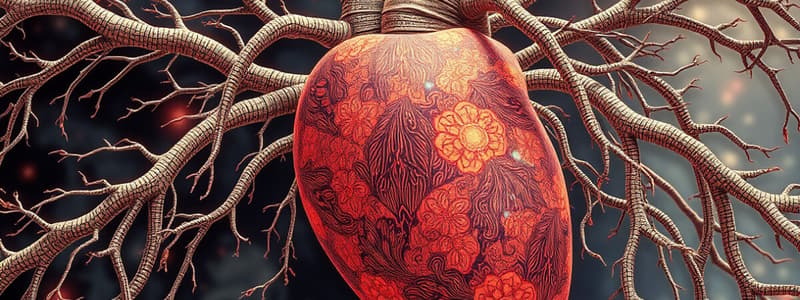Podcast
Questions and Answers
What does the left phrenic nerve innervate?
What does the left phrenic nerve innervate?
Diaphragm contraction and sensory interactions of most of the thoracic wall.
Where does the right phrenic nerve run?
Where does the right phrenic nerve run?
Laterally to the heart over the subclavian vein and right atrium.
What is ERP (effective refractory period)?
What is ERP (effective refractory period)?
A depolarisation cannot be initiated by an impulse of any strength.
What defines the RRP (Relative Refractory Period)?
What defines the RRP (Relative Refractory Period)?
What are disorders of impulse formation?
What are disorders of impulse formation?
What are disorders of impulse conduction?
What are disorders of impulse conduction?
What is abnormal automaticity?
What is abnormal automaticity?
Where do the origins of atrial fibrillation (AF) typically occur?
Where do the origins of atrial fibrillation (AF) typically occur?
What is Atrial Tachycardia (AT)?
What is Atrial Tachycardia (AT)?
Flashcards are hidden until you start studying
Study Notes
Left and Right Phrenic Nerves
- Left phrenic nerve innervates the diaphragm and sensory functions of the thoracic wall, running over the left ventricle.
- Right phrenic nerve courses laterally over the subclavian vein and the right atrium, playing a crucial role in diaphragm control.
Refractory Periods
- Effective Refractory Period (ERP): Represents the timespan during which a new depolarization cannot occur, regardless of the impulse strength.
- Relative Refractory Period (RRP): During this phase, a strong impulse, such as an ectopic beat, can provoke depolarization, exemplified by the R on T phenomenon.
Disorders of Impulse Formation
- Includes various conditions like altered automaticity, abnormal automaticity, triggered activity, and after-depolarizations, impacting heart rhythm.
Disorders of Impulse Conduction
- Involves reentry mechanisms, which can be classified as anatomical or functional, causing synchronization of the heart's electrical signals.
Abnormal Automaticity
- Occurs when phase 4 of cardiac action potentials shortens, either due to an increased slope gradient or a decreased threshold for excitation, leading to irregular heart activity.
Origins of Atrial Fibrillation (AF)
- Atrial fibrillation can arise from multiple sites including the atria, thoracic veins, pulmonary veins, superior vena cava (SVC), and the vein of Marshall, contributing to its pathophysiology.
Atrial Tachycardia (AT)
- Characterized by a rapid atrial rate (up to 300 bpm) originating from atrial tissue, presenting with fibrillatory waves of varying sizes, indicating abnormal atrial electrical activity.
Studying That Suits You
Use AI to generate personalized quizzes and flashcards to suit your learning preferences.




